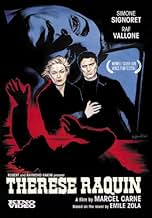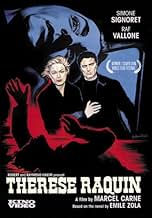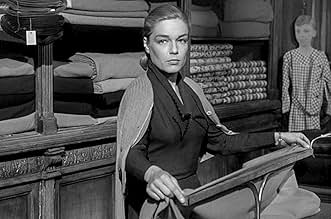IMDb-BEWERTUNG
7,4/10
2041
IHRE BEWERTUNG
Ein LKW-Fahrer tötet den Ehemann der Frau, die er liebt, und wird zum Objekt einer Erpressung.Ein LKW-Fahrer tötet den Ehemann der Frau, die er liebt, und wird zum Objekt einer Erpressung.Ein LKW-Fahrer tötet den Ehemann der Frau, die er liebt, und wird zum Objekt einer Erpressung.
- Auszeichnungen
- 2 Gewinne & 2 Nominierungen insgesamt
Martial Rèbe
- Grivet
- (as Martial Rebe)
Francette Vernillat
- Françoise, la bossue
- (as Françoise Vernillat)
Madeleine Barbulée
- Madame Noblet, une cliente
- (as Madeleine Barbulé)
Empfohlene Bewertungen
Thérèse Raquin (AKA: The Adultress) is directed by Marcel Carné and Carné co-adapts the screenplay with Charles Spaak from the Émile Zola novel. It stars Simone Signoret, Raf Vallone, Jacques Duby, Maria Pia Casilio and Roland Lesaffre. Music is by Maurice Thiriet and cinematography by Roger Hubert.
Carné reworks Zola's novel to be set in post-war Lyon and slips into a film noir gear. Plot essentially finds Signoret as Raquin, a severely repressed woman stuck in a marriage to her wimpy weasel of a cousin, not only that but she also has to share a home with his domineering mother. Then one day the strapping Laurent LeClaire (Vallone) enters her life, sparking a fiery affair, but as plans for the future are plotted, a turn of events drastically changes everything.
The characterisations are strongly performed, the five principals (Lesaffre arrives late in the play as a key character) giving performances that really draw you into their respective worlds, for better or worse as regards the human condition. Carné skillfully blends the beautiful side of Lyon, such as the quaint cobbled streets and the River Rhone, with a dull bleakness that fogs Thérèse, a woman who has forgotten how to smile, sexual fulfilment a non entity. Hubert also brings his photographic skills to the show, providing some blisteringly gorgeous night shots that offer hope for the new found lovers. But there is a sign post up ahead and it says that the next stop is noirville, and after having spent half the film building his characters, Carné dashes hope and replaces it with misery. Fate plays a big part in the crux aspects of the film, a film noir staple of course, right up to the clinical finale that comes with a thunderous fait accompli.
It's a bit draggy in parts as the director is at pains to show the humdrum side of life, but the change of gear at the mid-point - and the brilliant last quarter, make this a worthy addition for collectors of Frenchie noir. 8/10
Carné reworks Zola's novel to be set in post-war Lyon and slips into a film noir gear. Plot essentially finds Signoret as Raquin, a severely repressed woman stuck in a marriage to her wimpy weasel of a cousin, not only that but she also has to share a home with his domineering mother. Then one day the strapping Laurent LeClaire (Vallone) enters her life, sparking a fiery affair, but as plans for the future are plotted, a turn of events drastically changes everything.
The characterisations are strongly performed, the five principals (Lesaffre arrives late in the play as a key character) giving performances that really draw you into their respective worlds, for better or worse as regards the human condition. Carné skillfully blends the beautiful side of Lyon, such as the quaint cobbled streets and the River Rhone, with a dull bleakness that fogs Thérèse, a woman who has forgotten how to smile, sexual fulfilment a non entity. Hubert also brings his photographic skills to the show, providing some blisteringly gorgeous night shots that offer hope for the new found lovers. But there is a sign post up ahead and it says that the next stop is noirville, and after having spent half the film building his characters, Carné dashes hope and replaces it with misery. Fate plays a big part in the crux aspects of the film, a film noir staple of course, right up to the clinical finale that comes with a thunderous fait accompli.
It's a bit draggy in parts as the director is at pains to show the humdrum side of life, but the change of gear at the mid-point - and the brilliant last quarter, make this a worthy addition for collectors of Frenchie noir. 8/10
'Thérèse Raquin' (1953) (English title - 'The Adultress') is Marcel Carné's third post-Prévert film. Connoisseur film fans consider it his latest remarkable film. It was produced by the famous Hakim brothers. Even though Jacques Prévert no longer wrote his screenplays and dialogues, Marcel Carné did not give up good literature for this film, and took as inspiration the novel 'Thérèse Raquin', Émile Zola's first great success, a story about passion, crime and punishment in France in the second half of the 19th century. From Zola's (suspenseful in my opinion) story of guilty love and remorse, this adaptation turns into a thriller with elements of film noir. Still suspenseful, of course, but in a completely different genre. It's not a bad movie, but it's a different movie, different from Zola and different from other Marcel Carné movies.
We learn about Therese's fate from dialogues, quite late in the film. The story begins when she is already unhappily married to her cousin Camille, a hypochondriac feeble man caressed by her mother (played by an exceptionally well-composed actress named Sylvie), who terrorizes his young wife. Frustrated from all points of view, Therese seeks refuge in a love affair with a trucker dressed in a leather jacket played by Raf Vallone. The passion of the two inevitably leads to murder, and the murder leads to complications when they are blackmailed by an unexpected witness. It can be said that the film is built of two distinct parts separated by the crime itself committed on the train (here we are dealing again with a change of place, in the novel the deed takes place on water): in the first we witness the suffocating atmosphere in the house the bourgeois family, which builds the premises of the violent act and in the second we follow the consequences of the act filmed in thriller style.
The production is uneven, but it has some beautiful cinematic moments. Simone Signoret is gorgeous both physically and as an actress. Most of us know her from her mature roles and after that - here she is young and fascinating, with eyes whose deep blue we 'see' even though it is a black and white film. The scene of the confrontation with the tyrannical mother-in-law, played only by eyesights (her mother-in-law was paralyzed) is intense and memorable. Raf Vallone, however, is not, in my opinion, up to his partner. The psychological shortcuts of the plot are not sufficiently offset by the elements of suspense in the second part of the film. Paradoxically, Marcel Carné seems more at ease when filming outside, on the streets of post-war Lyon or on the banks of the Rhône. The director, who was to be pushed aside by the younger newcomers of Nouvelle Vague and included in the category of 'cinema du papa', shows that he mastered a few years before them mobility of the camera, framing of the characters on the streets or in nature and direct sound recording. 'Thérèse Raquin' is an interesting film that deserves to be watched or re-watched as a cinematic document, for Simone Signoret, and as a more than acceptable thriller noir. Less, perhaps, for Zola's novel that inspired it.
We learn about Therese's fate from dialogues, quite late in the film. The story begins when she is already unhappily married to her cousin Camille, a hypochondriac feeble man caressed by her mother (played by an exceptionally well-composed actress named Sylvie), who terrorizes his young wife. Frustrated from all points of view, Therese seeks refuge in a love affair with a trucker dressed in a leather jacket played by Raf Vallone. The passion of the two inevitably leads to murder, and the murder leads to complications when they are blackmailed by an unexpected witness. It can be said that the film is built of two distinct parts separated by the crime itself committed on the train (here we are dealing again with a change of place, in the novel the deed takes place on water): in the first we witness the suffocating atmosphere in the house the bourgeois family, which builds the premises of the violent act and in the second we follow the consequences of the act filmed in thriller style.
The production is uneven, but it has some beautiful cinematic moments. Simone Signoret is gorgeous both physically and as an actress. Most of us know her from her mature roles and after that - here she is young and fascinating, with eyes whose deep blue we 'see' even though it is a black and white film. The scene of the confrontation with the tyrannical mother-in-law, played only by eyesights (her mother-in-law was paralyzed) is intense and memorable. Raf Vallone, however, is not, in my opinion, up to his partner. The psychological shortcuts of the plot are not sufficiently offset by the elements of suspense in the second part of the film. Paradoxically, Marcel Carné seems more at ease when filming outside, on the streets of post-war Lyon or on the banks of the Rhône. The director, who was to be pushed aside by the younger newcomers of Nouvelle Vague and included in the category of 'cinema du papa', shows that he mastered a few years before them mobility of the camera, framing of the characters on the streets or in nature and direct sound recording. 'Thérèse Raquin' is an interesting film that deserves to be watched or re-watched as a cinematic document, for Simone Signoret, and as a more than acceptable thriller noir. Less, perhaps, for Zola's novel that inspired it.
Despite the considerable talent involved, this tale of passion and murder is pallid stuff. It's filled with bald plot-twists, ending with the ultimate of deux ex machinas, a huge truck careening down a small street for no reason except to kill off a major character, thus creating the pat ironic ending. Every plot twist is unconvincing, from the idea that Vallone and Duby would hit it off in any context, or that the couple would plan to leave a day or so after they told her husband about their affair rather than immediately, to the mother conveniently having a totally paralysing stroke at just the right moment. I guess one can blame Zola for some of this, but this updated version adds nothing.
A riveting modernization of the eponymous Emile Zola novel, THÉRÈSE RAQUIN chronicles the adulterous infatuation between a burly truck-driver and the beautiful, badgered wife of his feeble colleague that results in murder, blackmail and psychological-damnation. Marcel Carné deftly taps into the mechanics of American film-noir of the 1940s with conspicuous blending of plots of two celebrated James M. Cain classics: "DOUBLE INDEMNITY" & "THE POSTMAN ALWAYS RINGS TWICE" and skilfully harmonizes it with the drab and monotonous lifestyle of the French bourgeoisie. There are subtle nods to Hitchcock's "BLACKMAIL" and uncanny parallels with Park Chan-Wook's "THIRST" (which in retrospect make perfect sense as Park also borrowed significantly from the Zola novel.)
Simone Signoret is phenomenal as the titular lead and her transformation from a browbeaten wife trapped in a loveless marriage to a sympathetic femme-fatale is adroitly handled. Her restrained turn might seem too stoic at first but she exudes volumes through her apathetic veneer. Raf Vallone (reminiscent of a brooding Burt Lancaster) is convincing as the impulsive truck driver who's determined on unshackling Thérèse from her oppressive, wretched existence. Roland Lesaffre's addition as the greasy, opportunistic sailor further strengthens the elements of suspense in the story. The naturalistic B+W photography is excellent and maintains a healthy balance between carefully choreographed claustrophobic scenarios and exquisite exterior compositions.
Thérèse Raquin represents French film-making of the old school where storytelling was paramount and is recommended to connoisseurs of classic film-noir
Simone Signoret is phenomenal as the titular lead and her transformation from a browbeaten wife trapped in a loveless marriage to a sympathetic femme-fatale is adroitly handled. Her restrained turn might seem too stoic at first but she exudes volumes through her apathetic veneer. Raf Vallone (reminiscent of a brooding Burt Lancaster) is convincing as the impulsive truck driver who's determined on unshackling Thérèse from her oppressive, wretched existence. Roland Lesaffre's addition as the greasy, opportunistic sailor further strengthens the elements of suspense in the story. The naturalistic B+W photography is excellent and maintains a healthy balance between carefully choreographed claustrophobic scenarios and exquisite exterior compositions.
Thérèse Raquin represents French film-making of the old school where storytelling was paramount and is recommended to connoisseurs of classic film-noir
I'll have to disagree with some of the more negative comments about this film. Marcel Carne has succeeded beautifully in capturing the mood and major themes of Zola's novel in THERESE RAQUIN. It's nice to see a film from the period dealing with common working class people caught up in the turmoil of love and everyday life. The main romantic leads initially seem a little mismatched but by film's end the ice has more than melted between them. How many times have we seen the female lead fall too quickly for her suitor. Here it takes its sweet time and plays the better for it. Signoret's titular character seems almost a bit too stoic but considering her numbingly bland and lenghty marital situation, it may well be authentic. As many women are in reality, Therese is fiercely loyal to her husband, whether he deserves it or not. The ruggedly handsome Raf Vallone is ideally cast as the trucker who steals her attention and makes a good contrast to her dishrag of a husband. A blackmailing sailor who appears in the middle of the film before making a menacing reappearance near the end is very effectively played by Rolland leSaffre. He is as creepy as Robert Mitchum in CAPE FEAR. Do seek this one out and enjoy the ride!
Wusstest du schon
- WissenswertesRaf Vallone refused to be dubbed in the French version and had his contract amended accordingly. The scenario was also slightly changed to "Italianize" the character of Laurent.
- VerbindungenFeatured in Mémoires pour Simone (1986)
Top-Auswahl
Melde dich zum Bewerten an und greife auf die Watchlist für personalisierte Empfehlungen zu.
- How long is The Adultress?Powered by Alexa
Details
- Erscheinungsdatum
- Herkunftsländer
- Sprache
- Auch bekannt als
- The Adultress
- Drehorte
- Produktionsfirmen
- Weitere beteiligte Unternehmen bei IMDbPro anzeigen
- Laufzeit
- 1 Std. 42 Min.(102 min)
- Farbe
- Seitenverhältnis
- 1.37 : 1
Zu dieser Seite beitragen
Bearbeitung vorschlagen oder fehlenden Inhalt hinzufügen



























